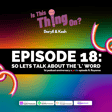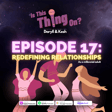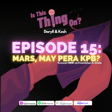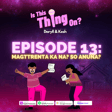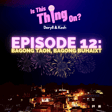Become a Creator today!Start creating today - Share your story with the world!
Start for free
00:00:00
00:00:01

Drunk upload
Recommended
Transcript
00:00:00
Speaker
So,
Introduction and Guest Intros
00:00:01
Speaker
hello, guys. Thank you for coming and being here in another episode of Rises Consientes. Sorry, Rises Consientes. I'm super glad that you accepted my invitation to have you here. So, the first thing that I want you is if you can introduce yourself
00:00:28
Speaker
to our public and you can describe yourself in three words. How will you do that? Let's start with Chloe. Yeah, for sure. I would say that I'm adventurous. Do I?
00:01:10
Speaker
So hello everybody, we are here in another episode of Raíses Consientes and this time I have
00:01:18
Speaker
the honor to be with Nathan, Mr. Nathan, better known as Mr. Nathan, Ms. Rian and Ms. Chloe. I work with them. They are really, really nice people.
00:01:32
Speaker
I knew them since almost a year, and I'm very glad to have you here in my podcast. Thanks for having us. Thank you. You're welcome, friends. Whenever you want, you are welcome. So the first thing that I want you to do is introduce yourself. So if you can describe yourself in three words, what will you say? Let's start with Chloe. Okay. I would say that I'm adventurous.
00:02:01
Speaker
Um, I would like to say that I'm patient too, and I'm a little bit stubborn. Oh, yeah. Stubborn bull, you know? Yeah. Yeah. We are terrorists. Sometimes I'm like that also. Yeah. I agree with that, but that's why we have quality to where we are. Yeah. And you, Ms. Ria. I would say I am always trying to be helpful and I am calm.
00:02:29
Speaker
And I also, I think I'm also patient, is Chloe, and I'm always trying to be patient as well. For sure. If you are a teacher, you need to. Yes, I agree with that also. And Mr. Nathan, what can you say to our public? Instead of, hello, everybody. How can you describe yourself in three words? Yeah, three words, probably like generous,
00:02:59
Speaker
I have a big heart probably. Oh yeah. I try to be funny, so I'll say funny. And then probably like nice as well. Just like super down to earth. Kind. Okay. Yes. I agree with all of you. I know you since, well, I knew you since August, last August. And I can say that, yes, I think that you are really, really good persons and also teachers. That's why we are here.
00:03:26
Speaker
And the next question that I have for you is, what did you
Educational Backgrounds of Guests
00:03:32
Speaker
study? I know that, well, I already say that we are teachers, but what did you study, like to be a teacher or pedagogy or what and where? So I studied at the University of Alberta and in Canada, you study really like directly in education. You do a great education and I
00:03:53
Speaker
Bachelor of General Education in elementary and I specialized in inclusive education so that's kind of like special ed okay and I've learned how to foster an inclusive environment and how long he takes it was a four-year degree okay four years yeah bachelor's degree so the
00:04:18
Speaker
You studied like the whole career and you also have like that plus like education, like an interracial education or? Yeah. So it really depends on which province you're in. So I know in Ontario, for example, you have to do a first degree and then you do an after degree in education in some parts of Canada, but I was lucky enough to be able to, from the whole four years, study in education.
00:04:45
Speaker
specifically for teaching elementary. Um, I specialized also in like teaching in a second language setting. So. Oh, okay. So which second language? French. Yeah. Wow. French Canadian. Okay. Perfect. Yeah. Because your first language is French. It is. Yeah. Okay. So I kind of learned, my whole degree was centered around teaching French in a minority. Now I'm teaching English in a minority. Wow. So it's your second language.
00:05:14
Speaker
English is my second language. Okay, perfect. Thank you Ms. Chloe and Ms. Rian. Well, I am also from University of Alberta, getting Bachelor of Education. What is different between my program I think I was in and hers is that I didn't need to specify anything so I took my generalist degree. So I learned like holistically like different subjects instead of specified in like one
00:05:43
Speaker
aspects of teaching. It also took four years as well. And it wasn't the same university? Were you studying together or without knowing? The university has a French campus so I was in that one. But I didn't have some classes at main and she graduated a year before me too. Oh, a year before. Okay, that's interesting. And then you met here.
00:06:14
Speaker
Wow. Nice. And Mr. Nita, can you share with us? Yeah. Yeah. Like where I went to school and stuff for sure. So I did four years, like Chloe was mentioning is a little bit different in Ontario, like where I'm from. So you have to do like a four year bachelor first. So I studied like English literature. So reading a bunch of books and like talking about themes and blah, blah, blah and all that good stuff.
00:06:41
Speaker
And then after that, you go to Teachers College. So I went to Ottawa U in Ottawa, the capital of Canada. And then I was there for two years. And then I knew like I wanted to come and travel somewhere because like teaching English
00:06:57
Speaker
So I was just like Mexico because it was the pandemic and I was looking for some options and Mexico was one of those places. So you came during the pandemic or? Yeah, I came like it started. I think pandemic was like March and I came September.
Teaching in Mexico: Challenges and Motivations
00:07:16
Speaker
It was like September of 2020. So I was like three months into the pandemic, three or four months.
00:07:22
Speaker
Yeah, March and September. You're right in September. Yeah, in September. Oh, wow. That was a big decision. No. Yeah. Yeah. It was to go to another country in a pandemic. Yeah. It was a lot. It was a lot. I didn't know what to expect, obviously, because like I know Canada definitely like closed down pretty quickly.
00:07:42
Speaker
But then like Mexico, obviously they let me come here. So it was like more open than Canada was. I want to say at the time, but still like some things were closed or like closing really, really early. So when I got here, it was like kind of more of the same as like home, like, you know, you can go out and eat, but you only have until like a five or six instead of like eight or nine. So it was just. Well, yeah, here we start like late, I think.
00:08:10
Speaker
with all the pandemic things. You guys were like, definitely. Yeah, super late. Then our president was like, hey, doesn't matter, whatever. You can come. And then after like three months, I think you realize that it was a, it was a risk. Yeah. Yeah. Okay. So the, the first question that I have for is, um, first of all, can you tell us how long you've been teaching?
00:08:40
Speaker
since when you were teachers you are teachers you were you were teaching this is my second year currently so i almost have two years of experience two years yeah the same two years yeah i'm three i'm just about to finish up i know yeah but it's been great it's been great perfect and now um well what motivated
00:09:08
Speaker
What would it be for you to teach in Mexico as a Canadian teacher? You already said that one of the options was Mexico. So maybe you can share why you chose Mexico and what was the other options that you have.
00:09:35
Speaker
Yeah, when I like graduated or like close to graduating, my idea was to go to like Southeast Asia at first. So it was like totally, Mexico wasn't even in like my mind at the time. And I remember like when those like countries closed because they were also like faster closed there.
00:09:53
Speaker
their borders too, I was like, oh man, what am I going to do? And then Mexico was kind of like you were saying the president didn't necessarily act right away. So the borders were pretty much still open as usual.
00:10:10
Speaker
so i was like why not apply to mexico because i mean like i visited here obviously not you've been here before yeah obviously not like the vacations or what yeah vacations
00:10:24
Speaker
Like, do you know Mexico? Yes, I know Cancun. I love Cancun. I really love Cancun. The beaches, I'm like... Do you go to the beach every day? I know. When I visited home, they were like, you're not as tan as I thought you were. You could be. I don't have a job. I don't live at the beach.
00:10:45
Speaker
Oh well. But it wasn't, yeah, like obviously it wasn't like the real Mexico, but I had like some background. And then like, as soon as I found out that like the job was here, like in Caratero, like I was researching the city. And the biggest thing was like, for my parents, like, is it safe? Like if you're going to apply and you're going to interview, like at least make sure, right, that if we're like, that if I'm leaving for Google, they just want like,
00:11:13
Speaker
the peace of mind, right? So it was more like that. And I knew like the culture would be great. I knew like the weather obviously. When you were researching, what did you find about Mexico?
00:11:25
Speaker
Well, I pretty much just researched like here specifically, right? So like I knew about the aqueduct. I think that was like one of the first things. And you Google it. And when you Google it, you see it. And then my parents were like, Oh my God, it's cool. I used to move water. And I was like, okay, I don't know if they still do, but we'll find out. So yeah, things happened pretty quickly though. Like I think I applied and then like six weeks later I was on a plane here. Wow. Being brave. Yeah, it was nuts.
00:11:55
Speaker
Okay, perfect. Well, one of the questions is how do you feel now? And we're going later to that question. So now, girls, can you share why did you choose Mexico? Did you have other options or this one, like just the one that you have? Well, do you want to go?
00:12:26
Speaker
The thing about me is I had an option of staying in Canada and teach or I also had an option. I had an option of staying in Canada and then that's when I got an offer from the school I'm in right now. However, due to pandemic, I wasn't able to get my visa to Mexico. So actually I was supposed to be here a year early, the same year as Nathan came.
00:12:56
Speaker
in the dose and 20? 20, 20, yes. I actually think like, because they told me I was here for somebody, I think it was for real. So like, what I figured out is that like, if you're in some like, outside of your country, it's really hard to get it. So I wasn't able to get it. And then so all of the options were gone. Like even the
00:13:26
Speaker
Canadian board I was applying for it like school board. They were telling me like well, you have to wait for six more month So I just decided to go back to Japan and then like the year later I had an option of like
00:13:40
Speaker
still going to Mexico or stay in Japan. Okay. But then like, yeah, but like my personality is like, I love traveling around. I need to moving around instead of staying in one place for a long time. So I was like, I'm down in Japan. I think I had enough experience in Canada. So I would like to learn the new culture, you know, like having new experiences.
00:14:06
Speaker
And that's pushed me a lot, I guess. And that's why I decided to move to Mexico. But did you research something before, like about Mexico? Or do you say just like, I want a new adventure and I'm gonna take it? I said yes first and then I did the research. My parents were
00:14:28
Speaker
sort of like afraid of me going to the country they never know what it was like so yeah so my dad asked me like you need to do a research I know you already accepted but you have to do a research and let me know how the country is so I made a hard point presentation explaining how safe it is especially in Kerepna
00:15:06
Speaker
And then they say like, yeah, you have a tent. You can go. They accepted me to go in there. Well, I know it's hard. It's hard in
00:15:20
Speaker
maybe come here to Mexico, it's not easy because what you hear about Mexico is like, well, instead of beaches, it's like, yeah, like wars and bad people. Let's say it like that. I don't want to be canceled, but yeah. But thanks God you're here because now I know you. So Ms. Chloe, what can you tell? Like, why?
00:15:50
Speaker
Are you here? Why did you choose the mixing cup? I think I was like, as I was about to graduate, everyone was getting jobs in the city that we were from. And I was kind of torn between like, I was really passionate about teaching already, but I was torn. Because your mom is a teacher. Oh, I grew up in the teaching world, and she's super passionate about it. But I was like wanting to travel. But I was also wanting to start my career. So
00:16:16
Speaker
I was like, oh, like how can I combine? And it was COVID too. It was like fall, I was like graduated in 2021. So I kind of saw this. You were graduated in 2021. Yeah. Okay. So that's when I moved here in August. Exactly. So it was like how I can just randomly go on trips. It's not open yet. So, and I kind of saw this as the best opportunity. I was like, oh, I can combine both of the things that I feel like I want to do in my life.
00:16:42
Speaker
I had traveled through central Mexico. I was one of those people who went on the coast to Mexico. We ended up taking a road trip through Guadalajara and Guanajuato in 2020 in the New Year's working for COVID and I just
00:16:59
Speaker
instantly fell in love with central Mexico. I was like this, there's a whole other world out here. So when I found out that there was a Canadian school in central Mexico, I was like sold, but I was also, I was applying everywhere. I was applying. I got another opportunity in Cambodia. I just wanted to go abroad, but this was definitely my top choice because I, as soon as I had the experience,
00:17:21
Speaker
like visiting Mexico. It's not just central Mexico. Central like the it's just there's a it's a whole other world there's so much to see and I just fell in love with it instantly and yeah zero regrets it's been okay you should go to Celaya someday. What is the famous thing?
00:17:49
Speaker
Whenever you want I can thank you guys. Okay so next question is what are the main differences you have noticed?
Comparing Educational Systems: Canada vs Mexico
00:18:00
Speaker
between the education system in Canada and Mexico. Let's, who wants to say the answer? I could go with what I've, from what I've kind of noticed is, I think Canada's really trying these days, they're obviously becoming more and more liberal compared to Mexico. And they're really trying to step away from the very traditional part of education.
00:18:27
Speaker
and more project-based stuff. Yeah. I think the kids like lead. Exactly. And also like, so for example, the difference between the curriculums, like I've had parents in Mexico say, but why aren't they memorizing their multiplication tables? Whereas in Canada, it's not about memorizing the multiplication tables. It's about why is five times five 25? Can you represent it in a picture? Let's make a project. And so I think from the,
00:18:57
Speaker
just talking on math, it seems to be more like about memorization and formulas and this and that. And I think Canada is just like I said, trying to have a more non-traditional approach and exactly like you say, like find the root of a problem and kind of make students in charge of their own learning too. Yeah, I think
00:19:23
Speaker
since a long time ago we were trying to do that but it's sometimes it's hard because here we have very traditional families of course and they ask you like why they are they are writing why they are not memorizing yeah like sometimes they ask you to go to the traditional so you're like i cannot like
00:19:48
Speaker
do something new if the parents doesn't know why. Like, you are trying to explain why they need to memorize these blocks, but also you need to know the root of it. It's just not like, ha, one for one is one. But... I almost said five times, I was twenty. Five times.
00:20:16
Speaker
Five is twenty-something. But the thing is, with our society that we're living in too, with all the technology, and things are evolving and it's difficult to keep a lot of traditional. Yeah, and most of the children ask you for it. Totally. It's like, no, that's boring. And you're like, what? So, okay, let's do another thing. And they are trying to get everything super fast as the technology.
00:20:45
Speaker
Yeah. I think that we should have a balance. Absolutely. Yeah. I think when you say traditional, I think of like, I don't know, I think it exists in Canada too, but here, especially just meeting with the parents like twice, three times a year or more, right? In special cases, like their focus really much is English and math. And here, like it's traditional, right? But back home, I think that happens too.
00:21:17
Speaker
concerned with the other subjects too, right? Because we don't just teach English and math, right? The kids have music and science and investigating, right? And I think like our school, like it's a mix of Canadian and then obviously like the set curriculum too. And we've had like a lot of like discussions about like the set being so much like further ahead of Alberta. And then it's not necessarily a great match using both, right? So like,
00:21:44
Speaker
I don't know, just talking about like the future of the school. I don't know what's going to happen there because I see a lot of differences between the curriculum and the speed, right? And like what the kids like should be knowing in SEP and then what their expectations are in Alberta. They're definitely not on the same page. Let's just say it for sure. No. SEP's a little more rushed, I feel like. It's not rushed, but different, maybe. It's hard because SEP's
00:22:10
Speaker
always it's always changing and they don't know where to start and then they don't see the result like we are like trying with this curriculum
00:22:20
Speaker
And then, next year, why don't we try another one? So it's like, it doesn't make sense. You need to see if this one is working and then change it. And not to bash stuff, but I feel like the people that design it don't really involve the kids. They don't really know what the kids need. They don't know. They don't seem to be the most inclusive.
00:22:45
Speaker
No, they are not. For example, how big school is it? If you can't keep up, you can't keep up. It makes a lot of people behind. Because the people that design the curriculum is not in a classroom. And it's not in the school. But in public innovation, well, we cannot talk about it because they have big opportunities. So it's like, well, what you can do as a teacher is just
00:23:12
Speaker
a handle with the children and try to teach and then the families, it's hard. Yeah. Yeah. So I agree also, like we are trying to have something different, but we still having like a long way to have a change. And also I know that families need to change because, well, maybe if they see,
00:23:39
Speaker
And you explain? Yeah, the beliefs of the family. If they are in art, if the children are learning science, they are also using math, they are also using language, like the transversal, and I don't know, cross-curricular. Cross-curricular. But yeah, so that's part of what I think also. And the other question that I have is, what challenges have you faced in the classroom?
Cultural Observations in Mexican Classrooms
00:24:08
Speaker
A second Indian teacher in Mexico, and how have you overcome them? I don't know. I just feel like when I got here, like, especially teaching. Sorry. You guys go. You guys go. Especially. Especially. What do I look like? Okay, Miss Rian, you can say one of the hardest part.
00:24:37
Speaker
I think culturally, Mexican people express themselves really, really big, like language wise, like their voice wise. So it was hard for me personally, I was born and grown up in Japan, which many of the students are really, really quiet.
00:24:59
Speaker
And they never like over the voice of the teacher. That's how we got educated in a way. So with respect, no respect. Exactly. That is like we've learned like just remaining quiet, paying attention to the teacher is like one of the key things we have to be focused on throughout the day.
00:25:19
Speaker
And like, so I came when I came here, the kids were like honking over me very like way louder than that. I was so I had to raise my voice like naturally and also like I decided to use different sound signals that helped a lot but it was
00:25:39
Speaker
Like I lost my voice 10 times. Yeah, for sure. Like throughout the week I was out of voice at the end of the day. Wow. So it was a huge challenge for me to like adapt myself to how big they express themselves. Like even their hugs. You don't give me the communication with parents. You don't, you don't, you're not used to the expressiveness. Yeah. Yeah. They are like, yeah, like,
00:26:06
Speaker
I think that is because first they don't have controls and sometimes the teacher is the one that needs to have specific strategies to control them. And in Japan it's like the family, I don't know, that's why I think you will say that is true. But the family is like the family respect the teacher and the family
00:26:33
Speaker
It's like, you should be like this in a classroom and your teacher is the one that is teaching you and you need to respect your teacher. And here is like, yeah, you can talk to your teacher. And then what happened now? It's like, why your teacher do that to you? Oh no, I'm gonna talk about it with your teacher. And I know that you need to have, I don't know,
00:27:01
Speaker
like control in the group, but sometimes it's like the, like what the parents say to the, to their children about the teachers and how to be with your teacher. I don't know if it's part of why in a Mexican classroom that happened. It's like a culture shock. It's part of the culture shock too. Just like in the school now and in Mexico too, like,
00:27:28
Speaker
I think, I don't want to speak for Chloe. I don't know if she feels this way, but I feel like the culture between Canada and here, it's not that different. There's a lot of similarities to the way people are. I've just noticed people are a lot more, let's use the word maybe, passionate about stuff here. Affectionate. Affectionate, passionate. They're not afraid to
00:27:51
Speaker
invite you into their house, for dinner, they're not afraid to invite you to Celaya, forget that. But I'm not a family. But we didn't know each other close right away. But I feel like people here are more approachable, more willing to get to know each other super fast. Yeah, that's true. It's cultural. Even if we have two minutes to know
00:28:21
Speaker
each other. I'm gonna tell you like do you want taquitos or do you want something like yeah that's part of it. Do you need anything? Do you need anything that you know like to make the other feel comfortable and warm and I don't know how to say it. Let me tell you my deepest darkest secrets the first day I know I just met. Yeah and also maybe with the children it's the same.
00:28:49
Speaker
like just the affection too like for example the for a student to come like hug me kiss me on the cheek that's not wow and like even the teachers call like yes we do have a certain amount of affection in Canada but it's like look not like that's not like
00:29:08
Speaker
I love, you don't usually say like, I love you. Yeah, there's levels to it. To the kids or anything. And now I do, obviously, now all about that affection. But that was something like, oh, wow, this is something different for you. Yeah. And then for me also was like, when I started being a teacher, I was like, I don't like a lot the affection.
00:29:36
Speaker
And then I was working in Montessori school and they say like, you need to ask if you want to touch children because they are not like toys or they are not like a pet. They are human beings and you need, they need respect. So you need to ask first if they want a hug or if you can take the hair or everything.
00:30:05
Speaker
And you will know if the children will allow you. And I was like, yeah, that's true. Sometimes here is like, yeah, like I, it's because you are a child, you need a hug. And you can see the child that is not comfortable, uncomfortable. And you're like, stop. So that's part of what maybe we need to change in. I don't know if all the teacher does that, but
00:30:35
Speaker
like part of respect also the the kids and say like you have your own space can I get inside can I tell you can I take like with another human being like that with a big one yeah I did have a student recently who's been in school for almost 10 months and I just found out that he doesn't like hugs yeah I'm like oh
00:31:03
Speaker
We kind of made like an agreement like okay from now on only if you come up and you ask me or I ask you but if you want to hug you can come hug me but I won't just hug you anymore. I didn't even think. I was like oh I'm just like talking about affection. I'm just becoming used to just you know everyone.
00:31:26
Speaker
Yeah, that's true because they have a lot of philosophy things, but one is like they are also human beings. You cannot talk behind the children. If you are talking about the problem of the children, you cannot cheat.
00:31:50
Speaker
Yeah, a lot of things, but yeah, that's part of like, we are learning as teachers because we have a lot of things also going on. And one of the questions that I have here for you is, what resources or strategies do you find most effective in teaching English as a second language to Mexican students? Mexico or five? What is this young code?
00:32:21
Speaker
I think I will say the strategy that I'm adding into about this, if they speak to me now, I do understand a little bit of Spanish. If they speak to me in Spanish, I don't answer. There are some second language teachers who do, for example, if a student speaks to them in Spanish, they'll answer in English, but for me, no.
00:32:43
Speaker
And it's hard. It is. I speak English but they answer in Spanish and I answer in English. And I used to do that in French. Like when I taught French, I would just translate it if they didn't know. But then when I first moved here, I wasn't able to do that because I didn't speak Spanish. But the development was
00:33:05
Speaker
snowball effect. It was way faster than it was in Canada because I couldn't answer in Spanish. They had no choice but to force themselves. And so I really, really, that's adamant about that. If they ask me, even if I understand, like, pardon, no, say it again, you know, and it gets annoying. It might be naggy, but for me, that's been always been my, now I know I'm going to go back to Canada and I'm going to be a French immersion teacher, actually. And
00:33:33
Speaker
I know that now. Like I'm going to be using that same strategy. I understand. Like, but no, like if they ask me a question in English, I'm not going to answer. They have to answer. They have to enforce themselves. Yeah. That's what happened. I think that's the best way I think also to learn a new language. If you have no one in any other option, you're going to force yourself in and you don't mind and you don't
00:33:59
Speaker
Carrie, if you're saying something wrong, because you're learning. You're learning. Yeah, and you're going to learn how. It's been very unique here too, because I'm learning Spanish. And sometimes I practice with them during lunch or something. So I feel like if I show that I'm vulnerable, and I make mistakes, then I find they're more comfortable too. Yeah, learning with that is the key. Whenever we learn new concepts or vocabulary that's hard,
00:34:28
Speaker
For them, I will also ask them, so we figure out the meaning in English because they don't even know it's Spanish. But do you know how to say this in Spanish maybe? We don't know how to say so we go to the Google and I show them how I would learn the words in Spanish.
00:34:47
Speaker
So like if we go to Google, does it seems like a right word? Like is it resonate the meaning? Well, maybe or maybe not. So let's look into it a little more. And that's the kind of process that they learned that we're also a learner and learning language with them. I think it's helpful for them. And now I see them like asking me to have an iPad to look for the meaning of the words instead of asking to the friends. So I see some skill development there as well.
00:35:14
Speaker
So I like just showing me. Vulnerable. Vulnerable.
Teaching English as a Second Language: Strategies and Growth
00:35:18
Speaker
Yeah, the keywords, I guess. Yeah. And the big thing with teaching, we do it every day, right?
00:35:23
Speaker
It's tough love, like it's creating adversity for the kids and you'll be really surprised like how quickly kids can like get past a challenge, right? Like every day is a challenge with something, right? Even if it's like review or it's practice, they have to go back and remember it, right? So the strategy you use, it builds them up, right? And it's tough love, which maybe some people would be like, hey, right? Like why are you doing that to them, right? The four kids. But kids are really, really adaptable and flexible and
00:35:53
Speaker
I think that they can do more than sometimes we even realize, right? And I've learned so much from them over the past three years. And that's grade one and two, so I can't imagine for you guys in grade three, that's even another step up where the kids can teach you all this stuff that you had no idea. So it's pretty cool. I think that's part of the vulnerability of what we were talking about.
00:36:18
Speaker
when we are teachers sometimes we think we need to know everything and sometimes they look at us like maybe she knows because she's a teacher and it's like no I don't know and it's the hardest part from being a teacher to accept that you don't know and you are learning also with them some things like well we have internet now like you are using the like the
00:36:46
Speaker
resources that you have. Like, let's look together to learn. And they start feeling more like into the things. Uncomfortable with you, like it goes back to like being vulnerable, like Chloe's story there, right? Like, just for them to see you as not just like, you know, you're not perfect, right? Like, you're basically one of them, just with a few more years. Sure. Learning about, yeah, also
00:37:16
Speaker
They know that what we are is guides from them. Like we are here to guide you because I don't know everything that's part of the traditional thinking. Like the teacher know everything that's not true. We are learning. We know like what, how can we approach you to the knowledge?
00:37:40
Speaker
and how we can guide them and I think it's like if you are learning a new language for me also is like I learned like since I was in preschool I was with English classes my mom was playing me videos and when I use English it was when I was living in the United States I was like
00:38:03
Speaker
And I was like, I don't know English. How am I gonna say this? I know. But it's super hard to express yourself in another language, but you need to try. And take it slow. So many times the kids think they have to be perfect. They're kids, right? They shouldn't have to worry about that.
00:38:28
Speaker
Yeah, it was the same way when I first came and like not knowing a lot of Spanish and teaching grade one and then coming from like preschool to a new building with a Canadian teacher, right? Like a native English speaker. I'm sure they were overwhelmed, but it's just like getting down to their level, talking slow, just taking it easy.
00:38:51
Speaker
probably up until like Easter, like in grade one, you just have to, like you're teaching it right now, you may, right? So you can see like the progression of the kids, right? From September until now, but it takes a while for them to feel secure. Yeah, because it's a big change. Like a teacher, they have maybe three teachers in the same classroom. And also, I don't know, they are very,
00:39:19
Speaker
like needing or how do you say like needing? Needy, yeah. They are really needy. And here is like, we are, but now we also, you need to be, to learn how to be independent. But yeah, now they are like, I don't need you. And I'm like, yes, you need me. For sure. Yeah, they're like girls. Yeah, I know they grow so fast. And well, another question is how do you establish strong relationships with your students?
00:39:48
Speaker
and your family's in a foreign country. This is like a job interview, I love it. It's good practice. I don't know, I think like relationships for me are like obviously like the biggest thing like right from day one that's like my goal to try and just get close to as many kids as I can especially like yeah definitely the first day, the first week, first month right that's like what it's all about because I think
00:40:17
Speaker
You can't be as good of a teacher. I don't think if your students don't trust you, right? And you don't trust them. There has to be kind of like that connection with this. And I realized like,
00:40:27
Speaker
having 20 plus kids in the classroom, you're not going to get close to everybody, right? And that's just the reality. Some kids aren't going to like you and you might not like some of them. They're through these. They can all be your favorite. So yeah, but you just have to like make the time. I think making experts and just it's all about comfort for a kid, right? Like if they're comfortable, they feel safe at school with you and the other kids.
00:40:57
Speaker
They'll give you more, no? And you'll see more of it ever. It's useless to try to teach when you haven't created that relationship. They made that mistake in the beginning where I was just trying to start with the academic stuff. It was useless because I didn't get out of structure. We didn't have, they didn't respect me. Yeah, that's the first thing that you need to build as a teacher, like confidence and
00:41:26
Speaker
also limits because in the limits, they know that you care about them. And it's also for me, it's like the first weeks you need to establish how it is going to work. Of course, you and me are going to be learning and we need to have confidence, but we need to establish how the environment will be for all of us to be confident, not just
00:41:56
Speaker
two or three children. And for me, that was like the biggest thing, like classroom management. It still is, right? And like, you're not done, you're never done learning new strategies. And with the diversity of students? Yeah, it's a rock. Yeah, it's crazy. And also, it's, I don't know, the families, how you approach with the families. Yeah, that's why I hate like, when people say you're just a babysitter, like, oh, no, come on, right? It's not just like managing your safety, because that's like another whole thing, right?
00:42:27
Speaker
Are they safe? Are the parents happy? Is your boss happy? Is your principal happy with you? Right? Especially here. Okay, we can cut that part. Cancel it again. She's gonna listen. She's listening. She's listening now. It's being played at committee.
00:43:09
Speaker
Sorry. So I'll establish a relationship with the parents also. Yeah. And the parents. I think keeping like constant communication. Right. For example, monthly newsletter. Yeah. Constant emails. But like, for example, even if it's something little like, Oh, he's been having a cough. I've been giving him calls. Is that okay? Oh, thank you so much for your kindness. Yes, of course. And just like, they appreciate it. Yeah. Even like a small wins, like not only the
00:43:28
Speaker
Yeah, no please no.
00:43:38
Speaker
negative things like whenever like he used to be like Using hands instead of mouth and today she said like stop once or just write a quick email saying like today this this boy you Told his friend to say stop Because that's that's part of the progress
00:44:05
Speaker
thought too like about the wind. And I feel like no no no and I feel like the kids do too because sometimes even like the messages from us get to the parents to the kids right so like if it's like they have a dance recital or if they have like a I don't know a karate show or something and you remember those things yeah not that it's like a must but it's if you have the time to like send that email then it goes a long way.
00:44:31
Speaker
Yeah, I think that establish also a connection with the families. It's super helpful. Oh, and sometimes you have like harder How do they say like what's involved? Yeah, like parents that doesn't care parents that have problems and you can see that in the children or So yeah for me is like if the children is the child is having a
00:44:59
Speaker
problems It's a struggling with something you need to go back and see like what's happening in the family. Yeah, for sure So yes, I wish that connection and have what you say communication constant communication with them It's the best way. Yeah, cuz then they can give you like, okay, we do this at home Okay, we do this in the class and if you kind of get on the same page yeah, if anything is beneficial for us because we know what to do, but also like they're
00:45:28
Speaker
following the same routine at home and at school too. Yeah and it's helpful to work as a team and it's hard sometimes because you know that they're here and wherever you can find difficult families. Yeah and sometimes you won't get along right it's like the same as the kids like you'll go you'll grow really close with some parents
00:45:55
Speaker
the opposite, right? Like, it might just not like you for whatever reason. And that's okay. There's just always something that you're doing wrong. You're not going to be able to please everyone. No. And as a teacher, I always say like, I don't know what that parent will do if they were there, they will be in my, in my shoes. Yeah, I don't know. Tell me what? No.
00:46:23
Speaker
But well, another question is how has your experience teaching in Mexico influenced your teaching practices and personnel growth as an educator? Oh, wow. I would say like, even though my degree was around teaching French in the minority, I think at first I was like, oh, well, I'm going to teach English. It's useless what I did in university, but taught me so many strategies.
00:46:51
Speaker
in terms of, and I've just become really fascinated by the study of language. And I think I do want to pursue like a master's in it later. So I think like mostly the language thing. And I just feel a lot more confident going in to future jobs now. Like I just feel like, you know, starting your career is difficult already in teaching. Like when I was first moved here, all my friends who I graduated with were like, oh my, I'm freaking out. I don't know. This is insane. This is so overwhelming. And I was like,
00:47:21
Speaker
Yeah, but I was doing it in another country. Like I feel like now I'm like, yeah, it's fine. Bring me three groups exactly. Like I feel like I'm like, oh, I can, if it was difficult for them, like I can do it. I got it. I, you know. Yeah. And maybe you can, the thing is like, you, you now will know how to handle the situations because
00:47:47
Speaker
each time that you are in a new group, you have different situations and you're like, what, what am I going to do with this? But now maybe with the experience, you can say like, oh, this work before, maybe I can try it again or ask or whatever. I kind of like that about the field though, is that how you'll never
00:48:09
Speaker
Something that works for one group is never going to work. No, you got to change. It's that growth mindset, like you need to constantly be finding you're always learning, you're always growing because each year, each month even is going to be different. Yeah. And that's what it gets. It drives me insane, but I think it gets me on my toes. And I think that's one of the reasons I really like what I do. Yeah. I'm not bored. We'll say that the reality of being a teacher. Yeah.
00:48:39
Speaker
And for you guys? Sure. Wait, let me see which one. How has your experience teaching in Mexico influenced your teaching practices and personal growth as an educator? These are deep, really deep questions. Think about it.
00:49:06
Speaker
I don't know, like just for me, like starting out teaching, I was like a mess. Like I feel like way more confident and comfortable now. Like I'm still probably a mess sometimes, but like it's way less often than it was, right? And just like, I think coming here in COVID, I know the changes of the school, the online learning, like having to adjust to that, right? From like the start and even like teaching from home.
00:49:32
Speaker
Before I moved, it was like a big adjustment, right? Because it didn't, it wasn't my image of teaching, right? Or what it was going to be. And like, even looking back, it wasn't really teaching, like it was like connecting on Zoom, going over the day and kind of just like sending them. And then we'd meet back like a couple times throughout the day, but it was like,
00:49:54
Speaker
Yeah, it wasn't, it wasn't real teaching to me, right? No, and you were in first grade, no? Yeah, yeah. First grade on Zoom was, yeah, like... Crazy. You try, right? But like... Yeah, but they are like... The parents are helping... They are thinking it's like... Yeah. Like five minutes and then... And then they're gone, right? Yeah. And then like the parents help, obviously. So like how much of it is there? And learning and how much of it is like...
00:50:21
Speaker
being read to them, right? Or like, even like being written for them. So that was a lot. And then like, last year, like the school did the bubbles. So it was like,
00:50:33
Speaker
learning online and then teaching kids upstairs, running downstairs because something happened. So that was a mess. And I feel like this year is the first normal year that I've been teaching for real. All the kids are in the class. Yeah, no masks, no COVID hours, things like that. So for me, having those two years, being a mess like that, I think it's kind of helped me.
00:51:01
Speaker
Like, bring me another pandemic. Bring me another pandemic. Give me more. Give me more. No, please don't. So, yeah, no, I feel like I've grown a lot as a person and as a teacher as well. And I just feel like I'm in a good place.
00:51:17
Speaker
And of course, next year it could go off the rails again, because that's going to be a totally different group and a different grade, right? So different country, different culture, everything. But I'm ready for the challenge. I feel like I'm more prepared than it was three years ago coming here. So yeah, I don't know. For me. I wish we as Mexicans can have that kind of opportunities. I think it's easier for you. Yeah. But here is harder.
00:51:47
Speaker
you need to have money, money, and maybe you can ask for, I don't know. It's scholarship? It's scholarship, yeah, all them kind of things. Do you mean it's more difficult for you to like go out on your own? Go out on your own, yeah. And it's also like going back to like the traditions, it's not that traditional, right? To leave the house like early, like at 18, right? Yeah. Like a lot of us do, but here I think like it's more common to stay
00:52:15
Speaker
Yeah, you know, the charity. And for you, maybe I don't know, it's like you are 21 now you need to look for your, like it's rare. Someone my age and kind of living with their parents.
00:52:32
Speaker
Yeah. And here it's like super normal. Like 25 living at home. It's like, oh, we're still living at home. What's happening? Yeah. Like it's very rare. Yeah. Very rare. Maybe it's also cultural in the economy. I think it is cultural. Like it's like a traditional thing to live with your parents until you get married and then you go with your husband. You know, it's yeah. Some people still seem to follow that kind of
00:52:59
Speaker
And it's not as easy as you may be to move by yourself, to live by yourself here. It's like, it's expensive. They didn't pay enough. Well, whatever. But that's another topic. It's real. Sorry, I'm going to start crying because I'm independent now and I'm feeling like money. Please send money.
00:53:26
Speaker
about my project. Let me share with you my account. But now, Andrea, what you learned here and what can you share with us? I think it's not much different from any other, you know, it's not specifically Mexican, but I think it's a struggle of many teachers in our years. But for me, like I learned a lot how to balance between my life in a work life. Because
00:53:56
Speaker
As a teacher, there's endless amount of work coming to us. We have to do this and that. And I used to stay up very late. I went back home and I would start working and I'd stay late. And next morning I came to school very exhausted. But now I learned that I need to maintain my life as well. So now I wouldn't work after certain hours. I tried to do something.
00:54:25
Speaker
that I can enjoy a lot more than like, you know, just like I'm trying to seek the joy of my life. Yeah, that's a big issue for teachers, I think, because sometimes you don't know when to stop because always they are asking you for things and you need to do the evaluations and then you need to do the planning and then you need to do the material
00:54:55
Speaker
Well, it never ends. We need to find how to handle personal life.
00:55:05
Speaker
And I think like, I don't know, for myself, it was really fun doing those things. Because it was my first job ever. Yeah. Yeah. I was like, yeah, I'm working and I love my kids. I want to come up with some. And you have your own desk. And you're like, whoa. That's pretty cool. You know about crying and meditating. That's so fun. Then I realized like when I, I just like completely like
00:55:33
Speaker
I was turned on at one point, like I went back home and was just like, I was like, okay, it is not healthy at all. It's not like my body is alarming because I have to stop it. Yeah. Okay. Yeah.
00:55:52
Speaker
Yeah, maybe all the teachers need to know. Yeah, that's an advice I give to like very new ones. Because my mom obviously was in the field. Oh, yeah. And she was here actually when I was first starting. Yeah. And I think I was on my computer at like nine or something. And she was like, that's not going to be a thing. You're not. No, you need to stop. You've been working since you came home and
00:56:15
Speaker
She's like, you need to accept that there's always something that's going to need to be done. Yeah. Even if you're one of those people like Mida, even if you're one of those people who are on top of things constantly, you're always going to have something that you could be doing. Of course, it's the nature of the job. Exactly. But you need to accept that, you know what, little by little prioritize
00:56:43
Speaker
you're always going to have stuff to do. And I think for me, that was really stressful at first. I was like, but no, there's so much I need to keep working. You know, I'm going to do the best I can. I'm going to make myself a little list. I'm going to do little by little baby steps. I'm not going to have a mental breakdown over this shit. And of course, because your personal life is there also before you're losing things because you're giving your life.
00:57:10
Speaker
to work and that have happened super often in like not just teaching, but in a lot of works. So take that advice.
Advice for Canadians Moving to Mexico
00:57:23
Speaker
If you're listening and you feel like you need to stop, stop. And one of the other questions that I have here is, can you share any memorable experiences that
00:57:37
Speaker
highlight the unique aspects of living in Mexico as a Canadian. Please don't say. Where did it begin? There's a lot. I think I would say there's a lot. I've had it the same experience. Don't cry. In my honesty, I think when I had first moved it was
00:58:01
Speaker
And I ended up like how my friend was seeing this guy who was bringing her to this party and I was like she kind of tagged me along and I was like no I'm not even invited I can't go to this party what do you mean? And it was like just the welcoming it showed exactly how Mexicans are like oh my where are you from?
00:58:32
Speaker
Exactly. So just like right away, like this was in the first month that I lived here, I was able to see just like the hospitality, the welcoming, the food and just in that experience, I was still kind of homesick at that point. And so to just be like, to go from like this, I don't know why I'm here. I'm so random. You brought me as, you're not even invited and I'm not even invited. But it was right away, it was like,
00:58:49
Speaker
up and they were like
00:58:59
Speaker
Welcome. What do you want to drink? And I was like, yeah, like, I don't know. It was the best. Yeah, it was a fun feature. Yeah. Of course, parties like the word that describes Mexico. The big party party and the sky. Yeah. Yeah. Yes. Now you guys.
00:59:27
Speaker
Go ahead. Um, I would say like I had a hard time blending in, like not blending and getting along with my team for the first week, just because like all of my team was new to the school and they were having hard time like getting what's going on there. So they didn't speak in Spanish a lot. And at the time I understood no Spanish, but at one lunch time I just saw them talking and I asked him, what are you talking?
00:59:58
Speaker
It is Spanish or in English? In English. I was like, what are you guys talking about? And they said like, yes. I knew it. I had no idea. And then they said like, it's just a cheese meat. I was like, what the heck is cheese meat? They began talking and talking in English. And that's how we get like bonbon. And I was like, now I learned like cheese
01:00:44
Speaker
Even now, if I'm in my classroom and somebody comes in and they're like, she's me. I'm like, do we close the door? Do we lock the door? On what scale? Is this closed door, she's me or locked door?
01:01:04
Speaker
What do you got? Oh my god, yeah. That's part of the teacher's life of Chisme. It keeps you on the top. It gives you energy. Yes, it gives you energy to continue. Nice. Well, yeah, that's true. Mexico, we love Chisme. Mr. Neaton! Yeah. Yeah, it's me. I don't know, like...
01:01:32
Speaker
I'm going to come in a copy and paste like Chloe's answer. Like when it first came, obviously it was the pandemic and people were like super on edge about being safe and all that stuff, right? And like, especially at the school, like no kids were there for most of that year. So I don't know, like people obviously like did a really, really nice job welcoming me. Like I'll shout out like Steph, Val, like they were the first two people that like I,
01:01:59
Speaker
like had contact with here. And even back home in Canada, like over Zoom, they were like on the camera, like, oh, I can't wait until you're here. Like we can't wait. And the school did like a little like mini party, like for me and just like gave me some like Mexican snacks. I got a little bottle of tequila from ballet. So yeah, so it was like the same, like super welcoming, like super fast. And just, yeah, that made me feel like this was my home and it's kind of become
01:02:28
Speaker
Sure, Mexico is food, party, and alcohol. Food party, of course. You can describe better Mexico. And now, what advice would you give to other Canadians considering a move to Mexico?
01:02:54
Speaker
Explore. Go. Take advantage of where you live. Don't be, obviously be careful, but like, I don't know how it's very simple and it sounds kind of stupid, but just take advantage of it. Yeah. I think it's easy to go here. I don't know. I think so. You wouldn't let me know, but. No. Yeah. Yeah. I think people get like, uh,
01:03:23
Speaker
image in their head of Mexico from news or from whatever, right? They get this like stereotype. But yeah, I don't think like it's take the chance. Take the chance. Embrace it. Embrace it. Perfect. Also the same cup of paste. Comfort zone. Yeah. Oh, hard, hard, hard. Yes. It would be hard in the beginning, but like that would change your life.
01:03:52
Speaker
I think one of the things that I said to myself constantly in the beginning when I was really uncomfortable was nothing magic happens in the comfort zone. Which has been a big phrase. Nothing but true for me. Nothing magic happens in the comfort zone. Anytime I was really homesick, or not homesick, but just like uncomfortable, I was just like, what, you're just going to go home? You know?
01:04:20
Speaker
So nothing magic happens in the comfort zone. No, nothing magic. That's true. And I think what is after that you go for it, it makes you like grow. And you say like, yeah, that's what I was looking for. This is living the life. Yeah, for sure. That's it's hard of course, living your country.
01:04:50
Speaker
going to another country, another language also. Like language barrier. Language barrier. And then I don't know, but here in Mexico for me is like, it's easy because our culture is like that. Like we try to make you feel us as home. Like supportive. We are your family supportive. Sometimes it's like, no, I need my real family. I need to hug my mom, my dad, my sister, my brother. Yeah.
01:05:20
Speaker
and spend time and also like speaking my language like I know that English is not your well is your first language but for you girls sometimes it's like I want to speak French I want to speak Japanese I need someone because that happened to me also but yeah I'm glad that you took that decision being brave and going out of your comfort
01:05:48
Speaker
comfort zone sorry blah blah blah and now let's see how was your time in Mexico influenced your personal throat yeah we don't yeah you don't already answered yeah we can skip that and if you can bring with you five things from Mexico what will you bring with you
01:06:16
Speaker
Five things. He made this one. Well, I'll give you person and self of it. I don't want to batty yellows. That's why I didn't write to person. Because I want to bring me. I just didn't want to say. I cannot be anywhere. Five things, wow. Chocolaty. Chocolaty. Oh, yeah. That's tequila, maybe. Mescale. Mescale. Tequila.
01:06:47
Speaker
Oh yeah, for the mezcal. Yeah. Tacos. Taco guys. You need to pack it. Oh, you gotta pack it. Yeah. You can't really pack it. Does it mean something we can pack or? No, I, anything you can. I would take it anywhere. This lens. Yeah. Like which one or? Gizme. Gizme. Yeah. Like the words that. The words. I would get you the words. Well, I learned. You can share with
01:07:17
Speaker
You're friends and then you can use it. Not a finger, yeah. Of course. Okay, well you didn't say five, but it's okay.
01:07:42
Speaker
And now, can you share three things you love and three things you will change about Mexican filter? Like I said, the hospitality, the food, the openness. I don't know if that would change that much, honestly. No. Girls get really jealous.
01:08:09
Speaker
Yeah. I think about Mexican girls it is. Girls like here are very like, you're looking at my boyfriend and I'm like, no, I wasn't. Oh, yes. That's true. Yes, because that's part of our culture like these. He's my man. Why are you talking with him or why are you looking at him and he's like,
01:08:32
Speaker
I wasn't, but chill. I don't want to have a look around. It's not your boyfriend. So I would say that. Okay. So that's like, you know, you guys will be changed, change something. I don't want to get cancelled. No, I mean, maybe just going back to like, that some things are like traditional, like, yeah, just to make them maybe like a little bit more like progressive. I would say like, there's a time and a place obviously, but
01:09:02
Speaker
Yeah. Yeah. I think like some things can be a little bit more progressive, right? And change like for the better. Okay. Just like maybe like the curriculum at the school, like CEP could be updated. Okay. Maybe a bit more. Again, updated again, but the right way. Yeah, the right way. No. Or just like people's ideas of what a family can look like or like, I don't know, just like little things like that.
01:09:34
Speaker
We're super. It's interesting to step back and forth, I find. Yeah. To go from Canada here and like, see the difference. We're very progressive now. Yeah. It's different. Well, maybe in 20 years. Maybe. Maybe. You can come again. Maybe in our lifetime. Rhianne, do you have anything? I don't know. Maybe like, time frame?
01:10:00
Speaker
when we decided to meet at... Oh my gosh! Mexican time. Mexican time. We're on Mexican time. If I want people to come at eight, I say five. That's true. That's true. Like, I don't mind. Usually, but yeah. No, yeah, but it's true. Here is like, if you say at seven, it's mine. Yeah. And that's not correct. At least, at least nine. It's like the time of the people. At least.
01:10:31
Speaker
I'm like, I'll stay in my house until you're there. Well, here in Mexico, it's okay, but if you go to another country, please respect. I know, it's going to be, people are going to be like, this is strange. What is this? Yeah, well guys, so I'm super glad to have you here in this episode. I know that
01:10:57
Speaker
You are leaving. That's hard because we just have like one year to meet each other. But that was enough to love you and have like a really good relationship. I know this is not the end. Maybe it's gonna be harder that we can met us like, I don't know, like we are right now. But I hope you enjoy your trip
01:11:26
Speaker
wherever you are and thank you for being here and also to teach us like how to live in another country and experiment new culture, new things and thank you.









